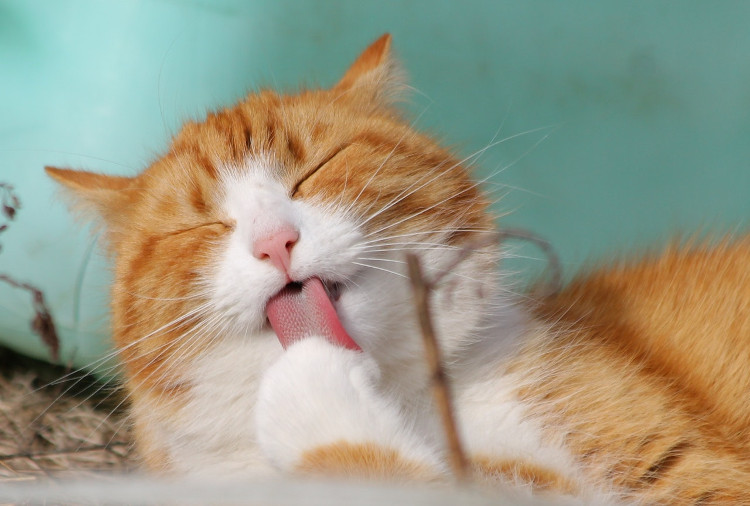![]()
Cats spend about 30-40% of their day grooming themselves. The rest of their time is mostly spent sleeping—this is a well-known fact among cat lovers! Families with cats usually love to groom and brush their cats. As icing on the cake, a cat can demand cuddles or brushing when they crave some extra love. What a life!
Cats are clean animals and have very specific sets of habits and routines. They are the friends that give you space, but also demand their own private time. This makes them ideal as pets as they take care of themselves for the most part. On the other hand, dogs are like those friends that want to share every detail of their lives with you. The different needs and commitment involved makes us gravitate towards either species as our preferred pet. Some, like me, want both and end up with both cat(s) and dog(s) as part of the family!
As cats are private pets and tend to spend a lot of time on their own—yes, mostly self-grooming and sleeping—it can sometimes be difficult to pick up early, subtle changes in their health. A good example is itchiness. Very itchy cats scratch themselves and make it quite obvious they are not happy. Mildly itchy cats may just groom a particular part of the skin more than usual. They may even groom the whole body excessively.
But how can we tell if there is a minor increase in a cat’s grooming habits? After all, your cat has always been grooming and has been in good health!
Let’s establish what the signs of itchiness in a cat may be. Scratching is the most obvious sign. People, cats and dogs scratch using their nails as a reflex. Head shaking, rubbing excessively against a surface, biting at paws are also types of itchiness in dogs and cats.
Humans also may itch their back using the edge of the door or wall. If your shoulder was suddenly itchy and hands were busy or dirty, would you not gently rub your itchy shoulder on a clean surface to relive the itch until the hands are free to help? I would!
If dogs lick themselves for more than a minute or two a day, it is considered to be itchiness. Increased licking of the skin is surely not normal. With cats, excessive licking (over-grooming) is difficult to assess but does happen.
If your cat is losing hair on a part of the body and you notice the kitty paying more attention to that area, you are likely seeing a case of itchiness. As cats may spend most of their time grooming themselves anyway, you may not see it as a problem until you notice patches of hair missing or possible crusts on their skin.
Here are Some Signs of Itchiness in Cats:
- Over-grooming – an increase in time spent self-grooming
- Scratching – using claws and paws to scratch an area; usually the chest, head & neck
- Nail pulling – biting and pulling at nails
- Rubbing – rubbing face on carpet, or rolling the back on floor more than usual
- Scooting – rubbing back end on floor or carpet
- Hair balls – hair can be ingested due to increased grooming and forms hair balls in stomach. These hair balls are then vomited out by the cat.
- Head shaking – a typical sign of itchiness in their ears
- Hair loss – trauma to hairs of a certain area can cause hair loss
- Skin rashes and crusts – trauma to skin can also cause rashes or infection
Remember, scratching is one of the forms of itchiness. All scratching is itching, but not all itching has to be scratching! Other behaviours such as licking, biting, rubbing, and head shaking can also be signs of itchiness.
Some Fancy Terms for Itchiness
Silent Grooming: Even when cats increase their grooming significantly, they may do this hidden from you. They may quietly “hide” in a private space and groom away. Or, they may simply over-groom at night. This behaviour is called silent grooming. This is likely due to cats being the friend that will keep their problems to themselves. Increased hair loss, skin rashes, and hair balls around the house can help us find out that kitty is silently over-grooming!
Barbering: Cats have tiny barbs (or hooks) on their tongue, called papillae. These hooks can lead to fine trimming of hair at areas where a cat is grooming excessively and repeatedly. The skin doesn’t always become bald at these areas but is just shorter like a barber may trim hair. This is where the term barbering comes from. Over-grooming of the belly commonly causes such hair loss.
Fur Mowing: Similar to barbering, the papillae on the tongue can cause the hair on belly to look like a nicely mowed lawn!
Dr. Bajwa: I wish I was half as good at keeping up with my home lawn mowed, as some of my patients’ hair is mowed when I first see them. But I even things out by making them mow their fur less and help their fur grow back, just like the grass in my yard!
Possible Over-grooming Causes
Where a cat focuses their licking can give clues to the possible problem. Here are some common reasons for a cat over-grooming or itching itself:
- Flea infestation
- Environmental allergy
- Skin and ear mites (parasites of skin and ears)
- Food allergy
- Skin infection
- Skin abscess
- Psychogenic alopecia (stress-induced licking)
If your cat has a painful area, he or she will focus on over-grooming that area. If your kitty licks to the point of breaking skin, it can cause an infection and with further licking, itchiness worsens. More itch triggers more infection and the vicious cycle can continue.
Identifying an underlying medical issue is the first step to fix the problem. Psychogenic or stress related hair loss is very rare. Before thinking of emotional reasons that may be making your cat obsessively lick themselves, allergy testing and a parasite check should be done. Stress can cause over-grooming for self-soothing, but is not very commoners the main problem. Stress should not cause any other signs of itchiness. There may be an overlap between stress and allergies, leading to over-grooming in cats.
What to Do About Excessive Grooming Behaviour
I find it best to consider excessive grooming as just a part of overall itchiness. If a cat is itchy and showing other signs, over-grooming is just a part of the puzzle. If over-grooming is the only itching behaviour of concern, additional signs like hair balls, hair loss, and skin lesions are usually helpful in finding the cause of itchiness.
Obtaining a veterinary exam or seeing a vet dermatologist should help check for causes. If there is infection, it will need treatment. Parasites like fleas also need to be treated. Allergies are typically the most common reason for over-grooming, which can be controlled. Allergies can be due to various causes though. Cat dermatologists are well versed in treating cats with allergies and isolating the underlying problem. Usually additional signs and factors are taken in to account rather than focusing on excessive grooming alone.
The best thing for your cat is to be patient and help the vet find the cause so your cat can go back to having the comfort he or she deserves. Then it will be back to lots of naps, cuddles, routine grooming and attention from human companions when desired—i.e. the good life!

Dr. Jangi Bajwa is a Board certified veterinary dermatologist at VetDERM Clinic in Surrey BC. He is also the dermatology feature editor for Canadian Veterinary Journal. Dr. Bajwa’s special interests include otitis and allergic disease in pets; as well as helping improve quality of life of pets and their families.



 by
by